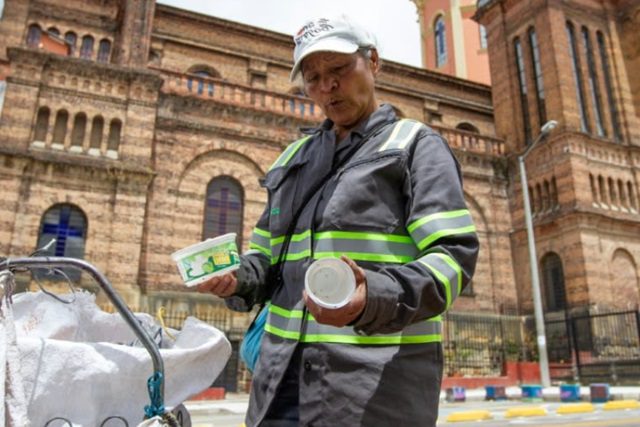BTN News: Miriam Calderón, a 68-year-old woman from Bogotá, Colombia, has spent her life working tirelessly. As a child, she tended cattle; as an adult, she cleaned houses. Today, she scrapes by as an informal recycler, earning a meager living by collecting and selling recyclables. Like many others in Colombia, she faces the harsh reality of old age without a pension. However, a recent pension reform introduced by President Gustavo Petro brings a glimmer of hope to people like Miriam who have been left without a retirement safety net.
Life on the Margins
With her gray hair and sturdy build, Miriam hauls heavy sacks of trash through Bogotá’s streets to support her household. She lives with her 85-year-old ailing husband, Francisco de Paula López, who was left incapacitated by a thrombosis. Miriam’s daily earnings of just three to four dollars barely cover their basic needs, often forcing her to choose between paying rent and buying food.
Walking through the steep, dangerous streets of Las Cruces, one of Bogotá’s oldest neighborhoods, Miriam ties her precious collection to a rickety cart. Her struggle is emblematic of the plight of millions of Colombians. According to the Ministry of Labor, Colombia has one of the highest rates of informal employment in Latin America, with 56% of the workforce operating outside the formal economy. This leaves approximately 2.6 million elderly Colombians without pensions and living in poverty.
A Glimpse of Hope
To address this dire situation, President Petro’s pension reform aims to raise monthly subsidies for the poorest elderly citizens from 30 to 55 dollars. Although still far below the minimum wage of 250 dollars, this increase lifts the most vulnerable above the extreme poverty line. Francisco, who once ran a domestic repair business, was among the first to receive the new subsidy. The modest increase brought tears of joy to Miriam, who felt a deep sense of relief and gratitude.
Wider Impacts and Future Prospects
The pension reform is set to expand its benefits to women over 57 and men over 62 in the coming year, unless right-wing opposition efforts to overturn the law in the Constitutional Court succeed. Miriam is defiant about the challenges to the reform, questioning why those who have worked hard should be denied support in their old age.
Deyanira Cruz, another beneficiary, shares a similar story. At 65, she recalls starting work at the age of 10, caring for her employer’s children. Living in a modest yet tidy apartment in Soacha with her daughter and granddaughter, Deyanira has spent her life working without formal employment contracts. She juggled various jobs, from street food vendor to construction materials messenger, while raising her children alone. Now, the government provides her with about 30 dollars a month, supplementing the household income from her daughter’s job as a security guard.
The Reform’s Framework
Under the current system, most employees contribute to individual pension accounts managed by private funds. The reform mandates that contributions for the first 2.3 minimum salaries go into a public fund. This shift will finance increased subsidies for millions of elderly Colombians. Despite facing legal challenges from right-wing parliamentarians, who argue that the reform was improperly processed, many experts believe the initiative is a step in the right direction. However, they caution that to ensure sustainability, the retirement age might need to be raised.
Conclusion
Miriam’s question to the reform’s opponents reflects the frustration and desperation of many elderly Colombians who have worked hard their entire lives. The new pension reform offers a lifeline, promising a modest yet significant increase in financial support. For people like Miriam and Deyanira, this reform could mean the difference between enduring dire poverty and living with a semblance of dignity in their twilight years. As the nation navigates the complexities of implementing this change, the hope remains that the reform will indeed deliver on its promise to uplift Colombia’s elderly and ensure a more secure future for all.


